Businesses use technology to run nearly every function, from storing customer data to processing payments and managing daily operations. This boosts efficiency and drives growth, but it also leaves the door open to cyber threats. Data breaches, ransomware attacks, phishing scams, and insider threats are becoming more common, and their impact can be devastating. Cybersecurity risk assessment companies step in to spot weaknesses, evaluate potential hazards, and give clear, actionable advice to strengthen security.
These companies focus on finding vulnerabilities, reducing risks, and protecting organizations in a constantly shifting threat landscape.
They also help businesses adopt new technology, they help businesses adopt innovations like cloud migration, AI adoption, and digital payments while keeping systems secure. When businesses secure their systems from the start, they can grow with confidence and avoid unnecessary exposure to risk.
The cybersecurity market is growing rapidly, with countless providers promising solutions, but not all of them deliver. To make things easier, we’ve put together a list of 20 cybersecurity risk assessment companies that stand out.
TOP 13 Best Cyber Security Risk Assessment Companies
1. Palo Alto Network
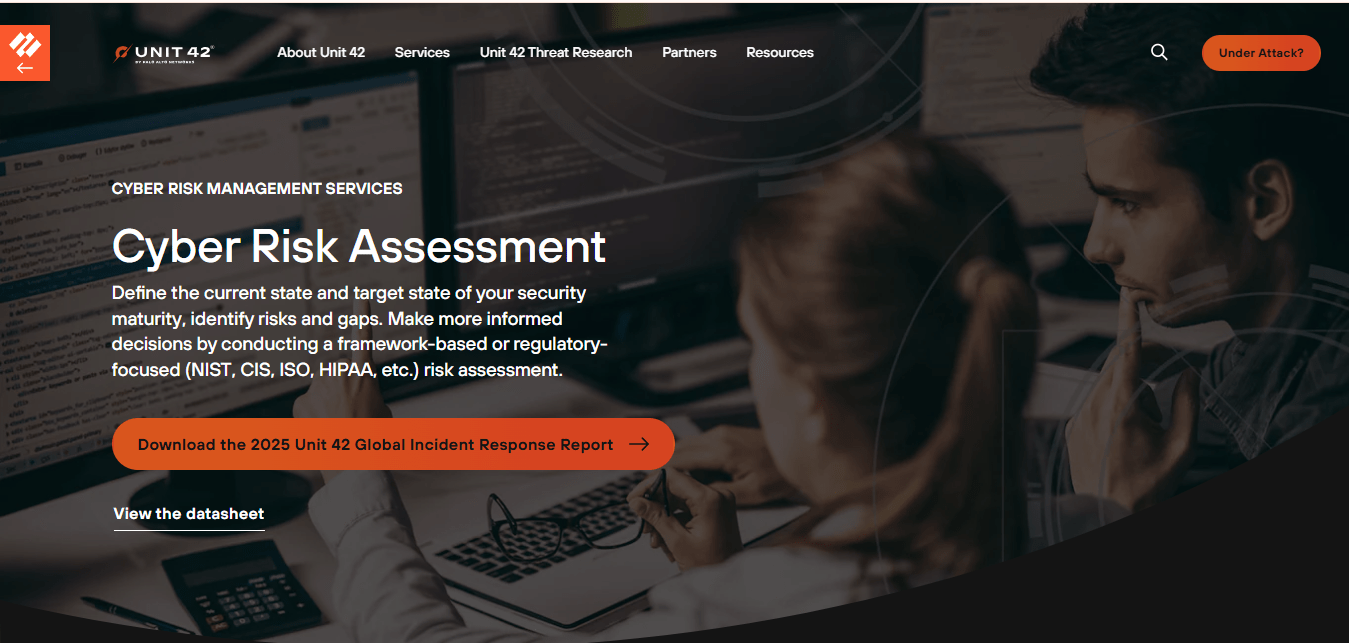
Palo Alto Networks delivers comprehensive malware detection and next-generation firewall solutions. The company first gained recognition for its advanced firewalls but has grown into a full security platform provider. Its core ecosystem combines firewalls with cloud-based tools to protect multiple layers of an organization’s IT environment. This integrated approach helps businesses manage security in one place instead of using separate, disconnected solutions.
Features
- Elite threat intelligence team: Provides expert insights on emerging threats.
- Extensive incident response experience: Responds to over 1,300 security incidents every year and has handled some of the largest data breaches in history.
- AI-powered platform: Uses Precision AI technology to deliver advanced threat detection and response.
- Comprehensive security portfolio: Includes zero trust network security, cloud security, security analytics, automation, and threat intelligence tools.
Pros
- Easy-to-set-up cloud security solution.
- Monitors and detects zero-day threats.
- Supports integrations with other security tools.
Cons
- High cost compared to some competitors.
- Lacks alerts for cloud performance issues.
2. Qualysec
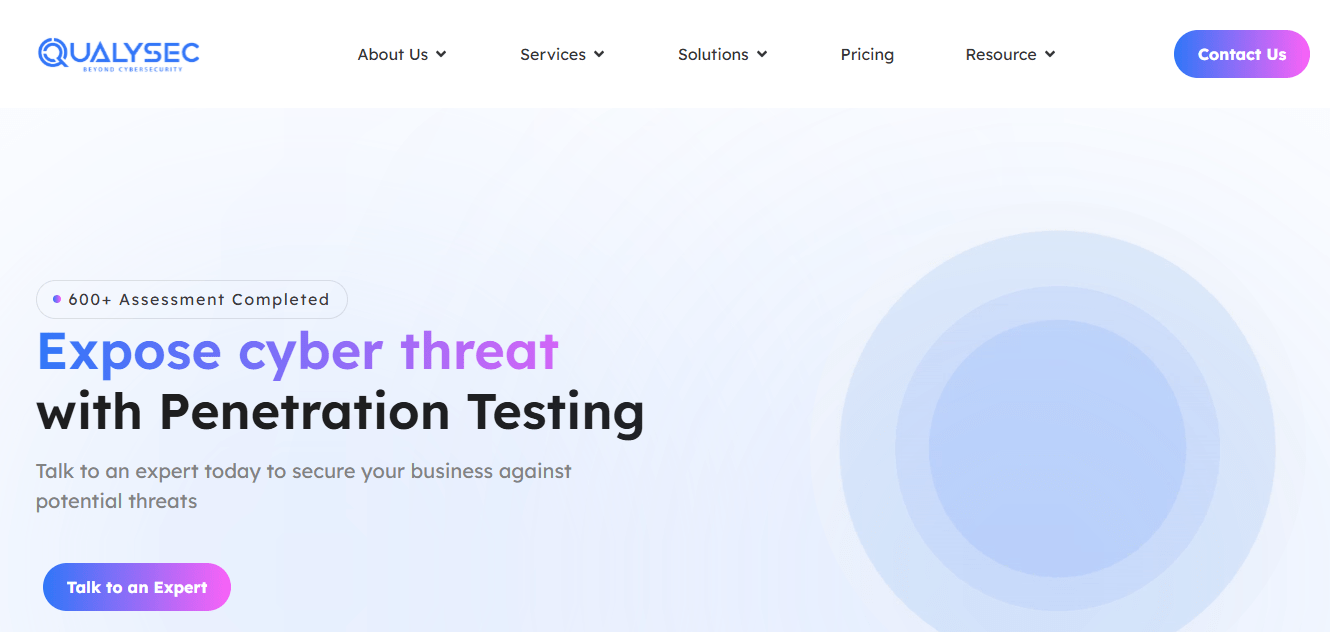
Qualysec ranks among the top cybersecurity risk assessment companies, focusing on process-based penetration testing services. The company provides security assessments for web and mobile applications, APIs, cloud environments, and IoT devices. Its experts use a combination of automated tools and manual testing to identify vulnerabilities and deliver actionable remediation guidance. Qualysec serves global clients across multiple industries, including finance, healthcare, government, insurance, and emerging technologies such as AI/ML, IoT, and blockchain.
Features
- Extensive Service Coverage: Web, mobile, API, cloud, external network, and IoT penetration testing
- Hybrid Testing Approach: Combines manual expertise with automated tools for thorough assessments
- Industry-Specific Expertise: Focused testing for fintech, e-commerce, SaaS, healthcare, and AI-powered applications
- In-Depth Security Analysis: Identifies vulnerabilities missed by standard automated scans
Pros
- Thorough Assessments: Delivers both automated and manual testing for maximum coverage
- Strong Communication: Clients praise responsiveness and clear project updates
- Detailed Reports: Includes step-by-step vulnerability reproduction and remediation guidance
- Post-Project Support: Provides continued assistance to fix identified issues
- Reliable Delivery: Consistently meets project deadlines
Cons
- Narrow Focus: Offers penetration testing as the primary service, not full-scale cybersecurity consulting
3. N-iX
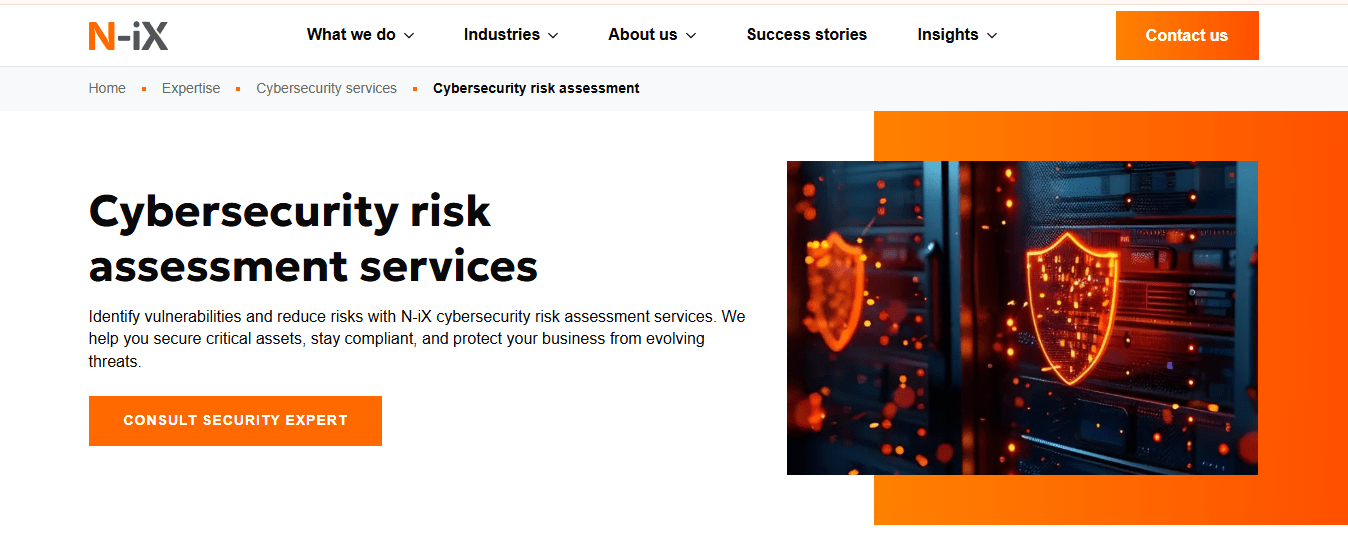
N-iX offers security services that grow with your business, including application security, governance and compliance, identity and access management, and security operation center operations. Their DevSecOps services help development teams build secure solutions and respond quickly to threats throughout the product lifecycle.
They also assist organizations in meeting regulatory compliance requirements in highly regulated industries such as finance, banking, and healthcare. N-iX holds certifications such as PCI DSS, FSQS, CyberGRX, ISO 9001:2008, ISO 27001, and ISO/IEC 27701:2019.
Features
- Comprehensive security assessment
- Protocol and process analysis
- Advanced security control testing
- Policy review and gap analysis
Pros
- Penetration and simulation testing
- Business-aligned assessments
- Actionable, prioritized reports
Cons
- Requires time and resources
4. Astra Security
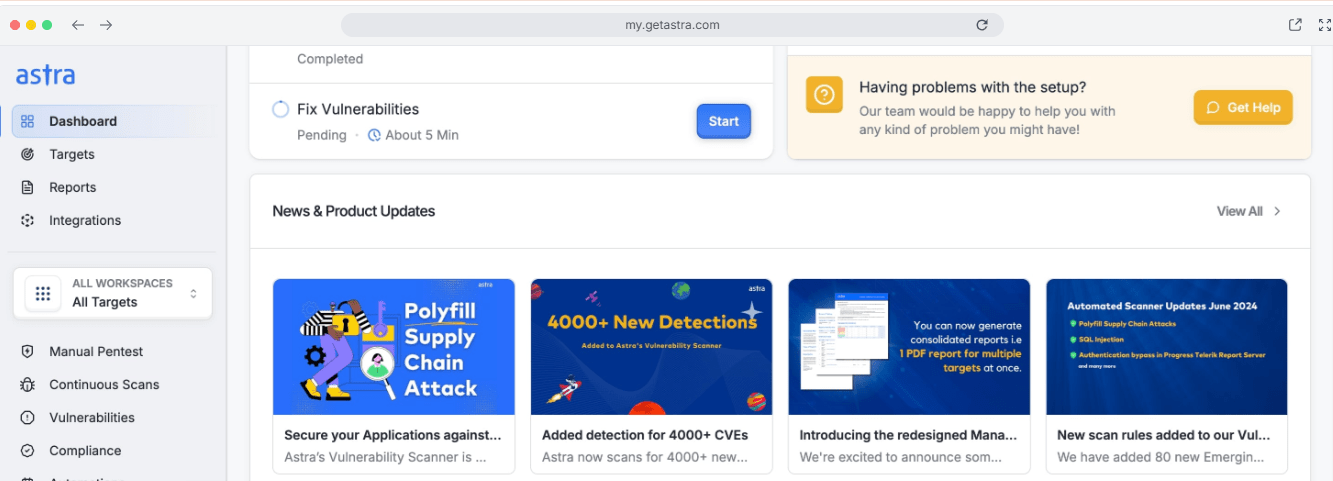
Astra Security actively protects websites through real-time malware scanning, a web application firewall, and continuous monitoring. While its price may be high, many users consider it worthwhile because it meets strict security compliance standards. Its AI-assisted engine quickly detects security loopholes, helping businesses address potential risks. Astra Security also offers enterprise-grade firewalls, continuous vulnerability scanning, and periodic penetration tests to ensure maximum protection for cloud environments.
Features
- Real-Time Protection: Blocks malware and attacks as they happen
- AI-Powered Detection: Spots vulnerabilities faster with automated scanning
- Continuous Monitoring: Keeps your website under constant watch
- Vulnerability Dashboard: Displays risks in a clear, easy-to-track interface
- Regulatory Compliance: Supports PCI-DSS, HIPAA, ISO27001, and SOC2 requirements
- Manual Penetration Testing: Adds human verification for extra security.
Pros
- Simplifies compliance checks
- Clean, intuitive dashboard for managing vulnerabilities
- Offers manual penetration testing for in-depth analysis
- Produces zero false positives for accurate results
Cons
- Limited third-party app integrations
- Can be challenging for teams with limited security expertise
- Some users feel the interface could be more user-friendly.
5. Cobalt Iron
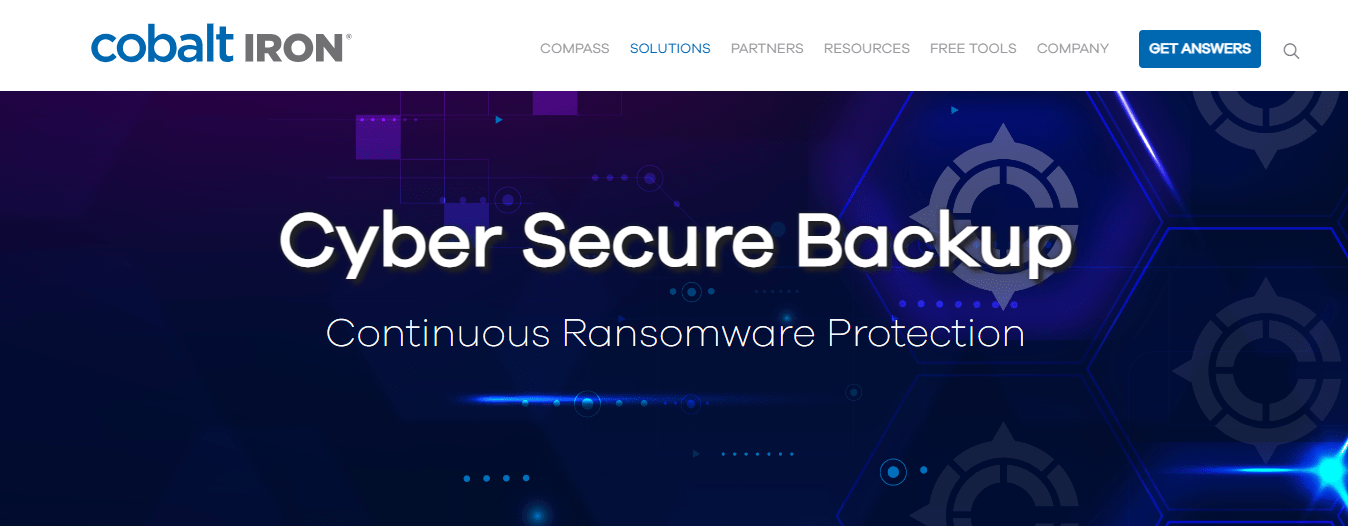
Cobalt Iron delivers data security and resilience by using hands-free intelligence to back up critical data. It applies layered security controls to protect against ransomware and immediately eliminates vulnerabilities discovered during the backup process.
In addition to its backup security, Cobalt offers both manual and automated penetration testing services. Organizations can request a pentest and receive results quickly. Its automated tool is designed primarily for web applications.
Cobalt’s SaaS platform gives teams real-time insights, enabling them to respond to threats and complete remediation efficiently. It also supports cloud scanning and multiple penetration testing methods.
Features
- Embedded Backup Security (Cyber Shield): Built-in protection, not optional.
- Zero Access Policy: Prevents credential theft and unauthorized access to backup systems.
- Multi-Factor Authentication (MFA) Support: Strengthens login security.
- SaaS Delivery Model: Provides continuous updates and patch management to minimize vulnerabilities.
- Holistic Visibility: Offers a complete view of backup environments, systems, and workloads.
Pros
- Simple and user-friendly interface.
- Reliable data backup and strong resiliency.
Cons
- Can be challenging for beginners to navigate.
- Considered expensive compared to some competitors.
6. Dataprise
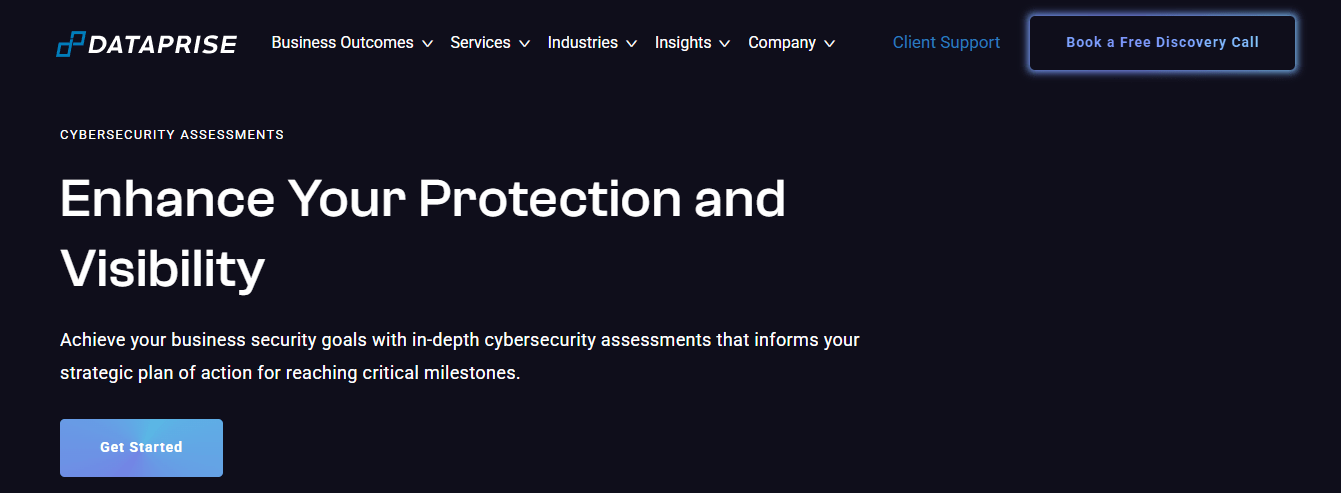
Dataprise provides cybersecurity assessment services as part of its managed cybersecurity solutions. Their experts help organizations understand their security posture, identify vulnerabilities, and create actionable plans to strengthen security. They focus on mid-market businesses and use certified security specialists to perform baseline evaluations, internal and external scans, penetration testing, and industry-standard benchmarking. Dataprise delivers maturity scores and prioritized recommendations that guide security decision-making and improvement efforts.
Features
- Personalized Assessment: Certified specialists conduct a detailed review of your current security environment.
- Comparative Analysis: Benchmarks measure your security posture against industry standards.
- Actionable Results: Clients receive a numerical maturity score, prioritized recommendations, and a practical roadmap to strengthen defenses.
Pros
- Responsive and timely client support with clear communication
- Strong technical expertise and versatile security solutions
- Option for continuous or recurring assessments
- Comprehensive view of the organization’s security posture
Cons
- Response or service times may occasionally slow down depending on the complexity of the issue.
7. Sophos

Sophos Cloud delivers enterprise-level cloud security by actively scanning for vulnerabilities, detecting and responding to threats 24/7, providing native protection, and automating security processes for DevOps teams. These services work as part of Sophos’ broader cybersecurity suite, which also includes endpoint protection, email security, and network security.
Features
- Attack surface discovery and visibility: Identifies all assets including unknown ones that attackers could exploit.
- Risk-based vulnerability prioritization: Evaluates vulnerabilities based on their risk level to help focus efforts where they matter most.
- Continuous monitoring and scanning: Keeps systems under constant observation to detect new threats in real time.
- Dedicated vulnerability experts: Provides access to specialists who guide and support remediation efforts.
Pros
- Works across AWS, GCP, and Azure environments.
- Supports security automation with DAST, SAST, and SCA code analysis.
- Offers an intuitive, user-friendly dashboard.
Cons
- Can be expensive for some businesses.
- Setup process may be complex.
- Customer support quality could improve.
8. Rapid7
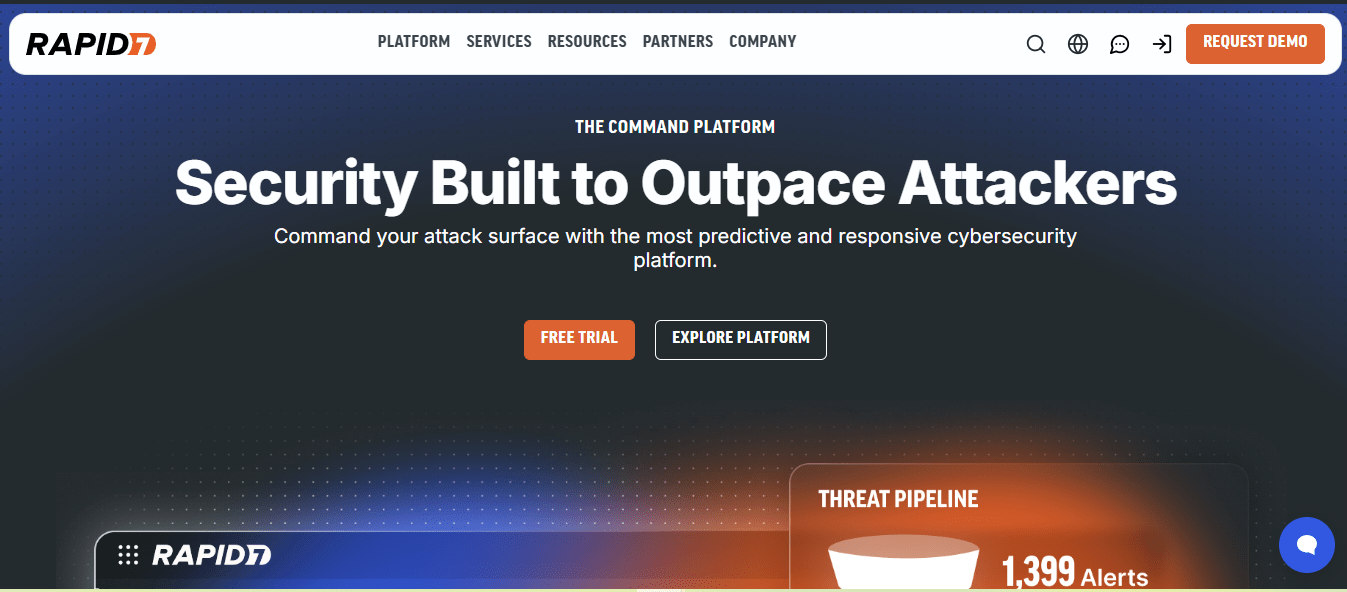
Rapid7 delivers predictive and responsive cybersecurity through AI-driven technology. The company equips organizations with complete visibility across their digital attack surface and strengthens defenses with integrated threat intelligence and automated response capabilities. Its tools help teams detect vulnerabilities, analyze risks, gather actionable threat intelligence, and execute remediation workflows effectively.
Features
- Vulnerability Management: Identify, assess, and remediate system weaknesses.
- Discover, map, and monitor all assets (on-premises, cloud, and endpoints).
- SIEM (Security Information & Event Management): Collect, analyze, and respond to security events in real time.
- Managed Detection and Response: Provide 24/7 threat monitoring and incident response.
- Protect workloads, configurations, and applications across cloud environments.
- Gather insights on attacker behavior and emerging threats.
Pros
- Simple and easy-to-navigate interface.
- Detects hidden vulnerabilities effectively.
- Produces clear, easy-to-understand reports.
Cons
- Customer support needs improvement.
- Device removal after scans requires manual action.
9. Zscaler
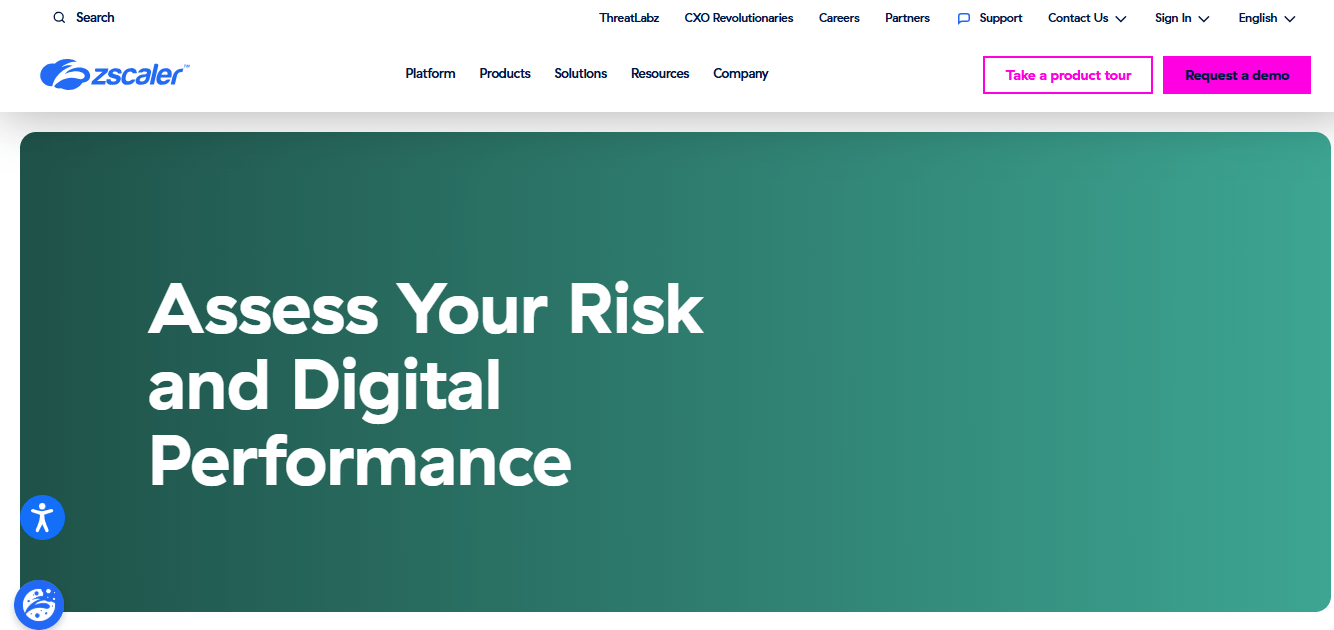
Zscaler gives a strong zero-trust security posture that users can actively manage at every level. It protects web, email, and mobile computing through its distributed cloud-based security, no matter where users are located. The platform detects SaaS application misconfigurations and access issues, provides remediation measures, and sends alerts for any anomalies or threats it discovers.
Features
- Advanced Risk Management
- Zero Trust Exchange Platform
Scanner Capacity: Cloud, Network
Accuracy: May produce false positives
Compliance: ISO 27001, ISO 27701, SOC 2
Pros
- Offers end-to-end zero-trust security
- Works across all user locations
- Alerts users to threats and anomalies in real time
- Supports major compliance standards (ISO 27001, ISO 27701, SOC 2)
Cons
- Potential for false positives
- May require manual effort to address flagged vulnerabilities
10. Archer
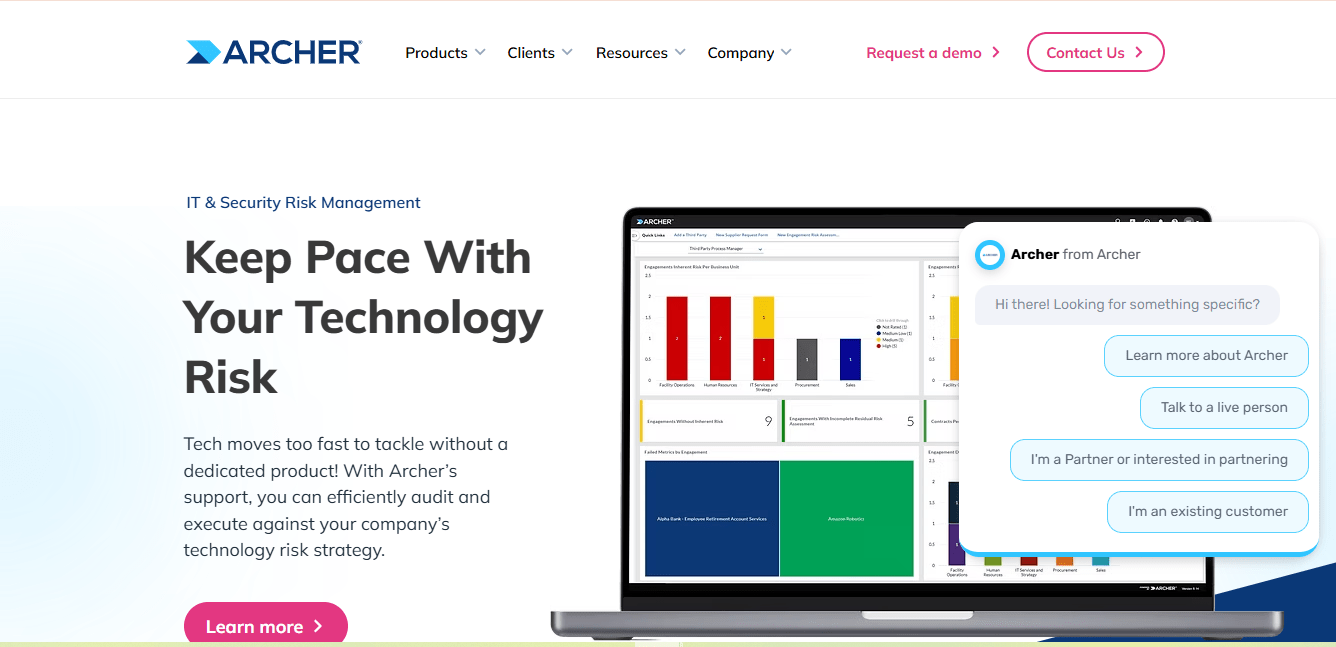
Archer delivers an integrated risk management platform that gives enterprises full visibility into their risk landscape. It consolidates risk data across the organization, applies risk analytics, and presents a unified picture of risk. Organizations use Archer’s customizability, advanced analytics, reporting tools, and automation features to gain deeper insights, enhance decision-making, and improve operational efficiency. Its adaptability makes it suitable for businesses in various industries and regulatory environments.
Features
- Built-in risk taxonomy for standardized classification
- Integration with industry standards for compliance
- Financial information database for risk quantification
- Predefined workflow templates to support governance processes.
Pros
- Holistic Risk View: Consolidates risk, compliance, audit, and control data into a single platform, minimizing silos
- Customizable Modules & Workflows: Enables organizations to configure modules, workflows, and control libraries to meet business or regulatory needs
- Compliance Support: Maps controls to regulatory frameworks to simplify compliance efforts
- Rich Reporting and Dashboards: Provides detailed reporting and visual dashboards for better insight into risk metrics
Cons
- Outdated User Interface: Some users find the interface less modern, with slow or unintuitive navigation
- Performance Issues with Large Data: The platform may experience lag or slow performance when handling very large datasets
11. ELEKS
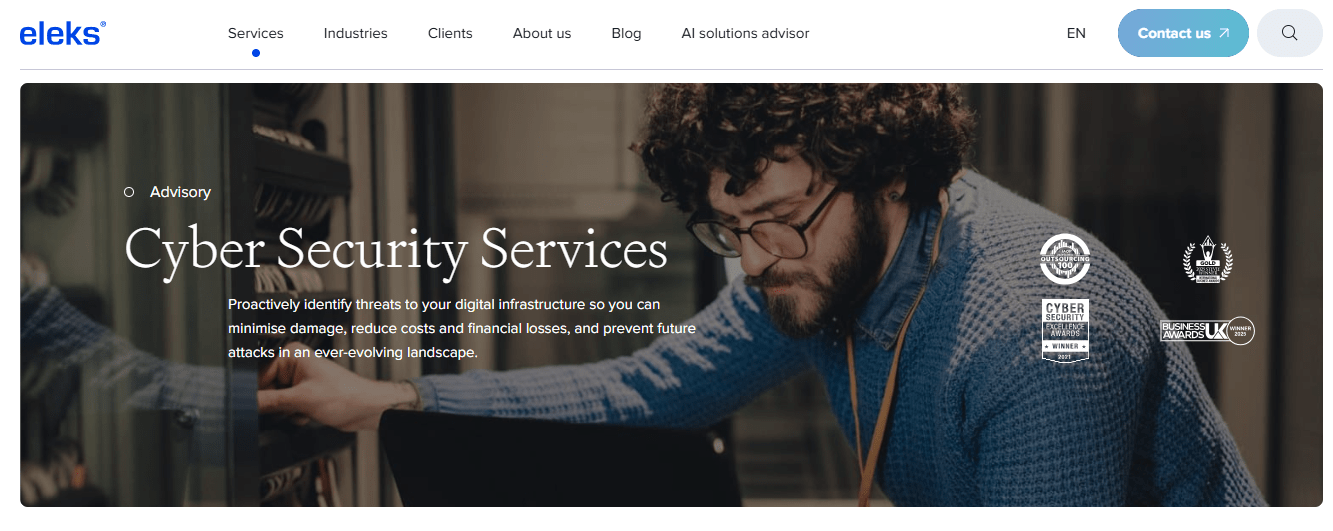
ELEKS help businesses protect their systems and meet industry regulations. Its cybersecurity services include managed services, evaluation, testing, analysis, reporting, and implementation. The company also developed its own compliance application platform, eCAP, which automatically handles compliance requirements for multiple sectors, including fintech, logistics, retail, insurance, healthcare, and automotive.
Features
- Compliance Automation (via eCAP): Maps organizational controls against various regulatory frameworks and requirements.
- Security Audits and Testing: Conducts audits and penetration tests to verify system security and identify vulnerabilities.
- Regulatory and Standards Compliance Assistance: Guides businesses in meeting industry standards and compliance requirements.
- Industry Credibility: Holds certifications such as ISO 27001, demonstrating expertise in security and compliance.
Pros
- Automation with eCAP: Reduces manual compliance work and accelerates gap assessments.
- Faster Policy Updates: Keeps policies aligned with evolving regulations.
- Proven Experience: Delivers consistent results through audits, testing, and compliance expertise.
Cons
Limited Context Awareness: Automated tools like eCAP may miss nuanced or context-specific risks.
12. CrowdStrike
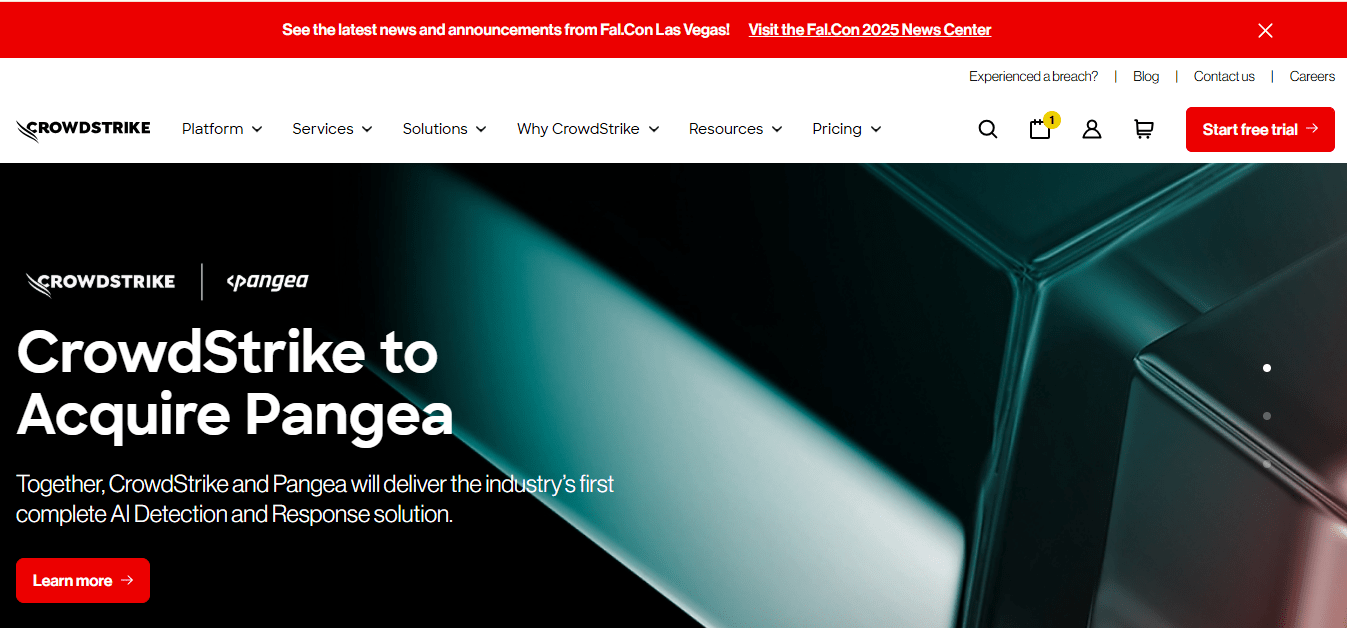
CrowdStrike builds on its expertise in endpoint protection to deliver comprehensive cybersecurity solutions. The company offers XDR (Extended Detection and Response), MDR (Managed Detection and Response), Vulnerability Management as a Service (VMaaS), and Cloud Security Posture Management (CSPM). CrowdStrike focuses on fast threat detection, integrated threat intelligence, real-time monitoring, and both proactive and reactive security measures. It also helps organizations maintain regulatory compliance by providing incident visibility and auditability.
Features
- Endpoint Protection / EDR: Detects and responds to threats on endpoints, blocking malware, zero-day exploits, and fileless attacks.
- XDR (Extended Detection & Response): Correlates telemetry across endpoints, identity systems, cloud environments, and networks for broader threat visibility. Falcon Insight XDR is the flagship module.
- Next-Gen Antivirus (NGAV): Uses AI/ML to prevent known and unknown malware through behavior-based analysis.
- Threat Intelligence: Delivers continuous updates, tracks adversaries, integrates threat data, and profiles attacker groups for faster response.
Pros
- Strong detection capability: AI, machine learning, and behavioral analysis identify threats early.
- Unified platform: Combines EDR, XDR, threat intelligence, and cloud security for wide security coverage.
- Lightweight and cloud-native: Deploys quickly and requires minimal on-premises infrastructure.
Cons
- High cost: Considered premium software, with some features locked behind higher-tier plans.
- False positives and alert fatigue: Behavioral detection can misclassify safe activities, requiring manual review.
- Complex setup: Some users find dashboards, policies, and workflows challenging to configure and tune.
13. CyberDuo
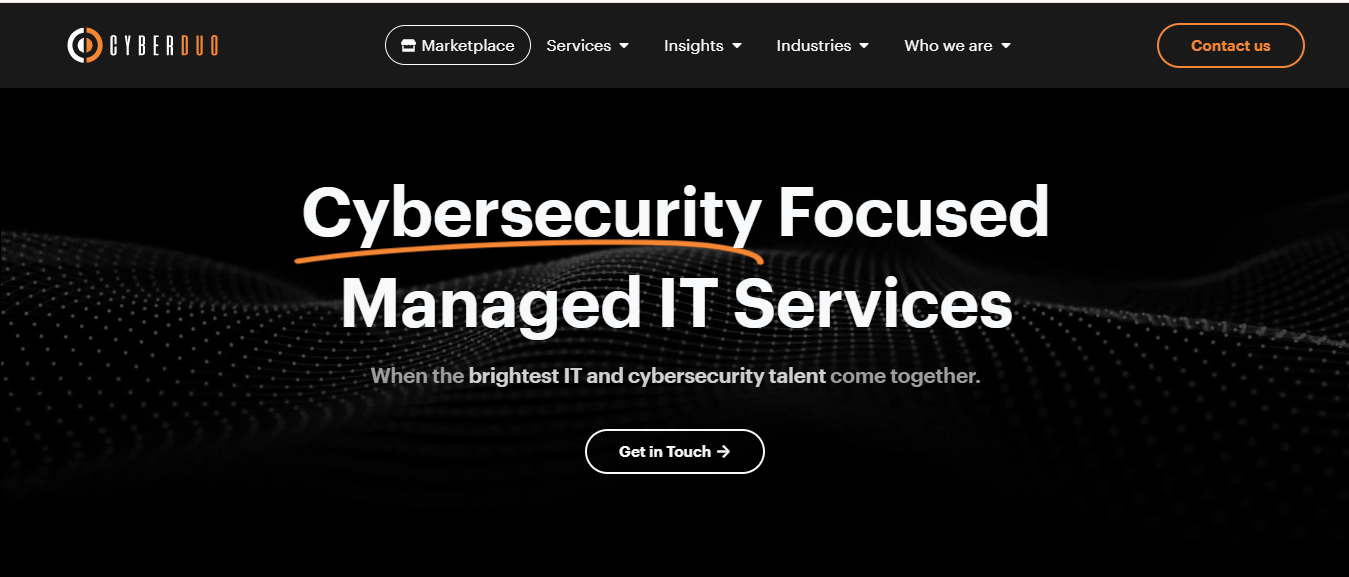
CyberDuo focuses on serving small to mid-sized businesses (SMBs) but also supports larger enterprises. The company follows a “security-focused managed IT” model, combining IT infrastructure and cybersecurity into a single, integrated solution. It offers vulnerability assessment and management, endpoint protection, EDR, managed firewall, SIEM and log management, cloud security, compliance services, and security awareness training. CyberDuo works with industries such as healthcare, automotive, finance, media, and education.
Features
- Cybersecurity Risk Assessment and Gap Analysis: CyberDuo assesses the organization’s IT and security posture, identifies vulnerabilities, and creates a remediation plan.
- Vulnerability Management: It performs regular scans and monitors endpoints, networks, and cloud assets for weaknesses.
- Managed Detection & Response (MDR): CyberDuo provides 24/7 monitoring to detect, block, and investigate threats.
- Incident Response: It investigates breaches, assesses damage, remediates the issue, and prevents future incidents.
Pros
- Offers a comprehensive platform focused on advanced cybersecurity services.
- Protects businesses from both internal and external threats across the web.
- Long-term users report consistent and reliable protection for their systems.
Cons
- Customer support often fails to respond promptly or professionally.
- Representatives sometimes appear unfamiliar with the platform.
Choosing the right cybersecurity risk assessment company isn’t just about ticking boxes, it’s about finding a partner who truly understands your business and can protect what matters most. Remember, the best cybersecurity investment is the one you make before you need it. Don’t wait for a breach to discover your vulnerabilities, take action now. Review your current security posture, identify gaps in your defenses, and partner with one of these trusted cybersecurity risk assessment companies to build a stronger, more resilient business.

